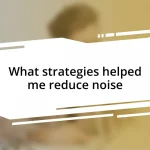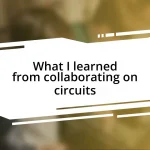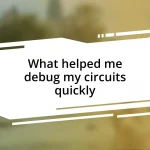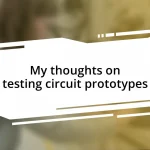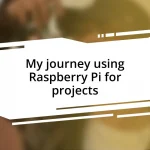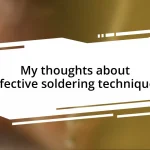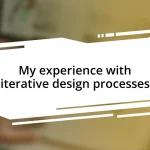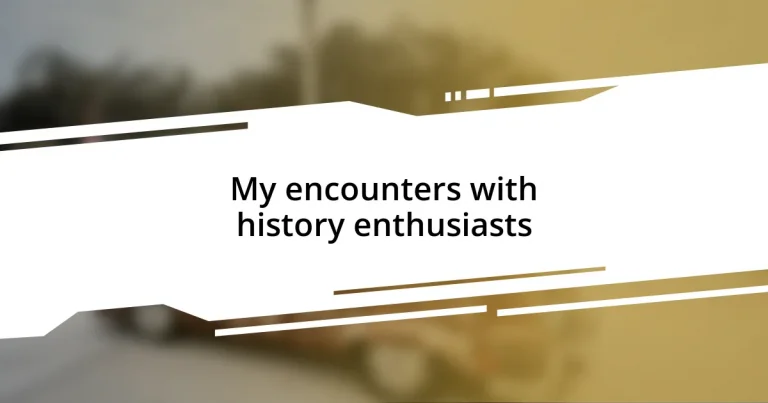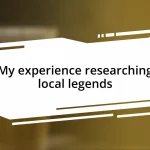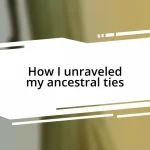Key takeaways:
- Engaging with history enthusiasts fosters passion and connection, as seen in conversations and community activities that reveal personal stories and shared experiences.
- Different types of history enthusiasts, including Casual Buffs, Academic Historians, and Living Historians, each contribute uniquely to the understanding and appreciation of history.
- Participating in discussions, such as book clubs and workshops, enhances insights into historical narratives and encourages critical thinking about contemporary society.
- Creating an inviting atmosphere for conversations about history, such as themed gatherings and sharing artifacts, deepens bonds and fosters meaningful dialogues.
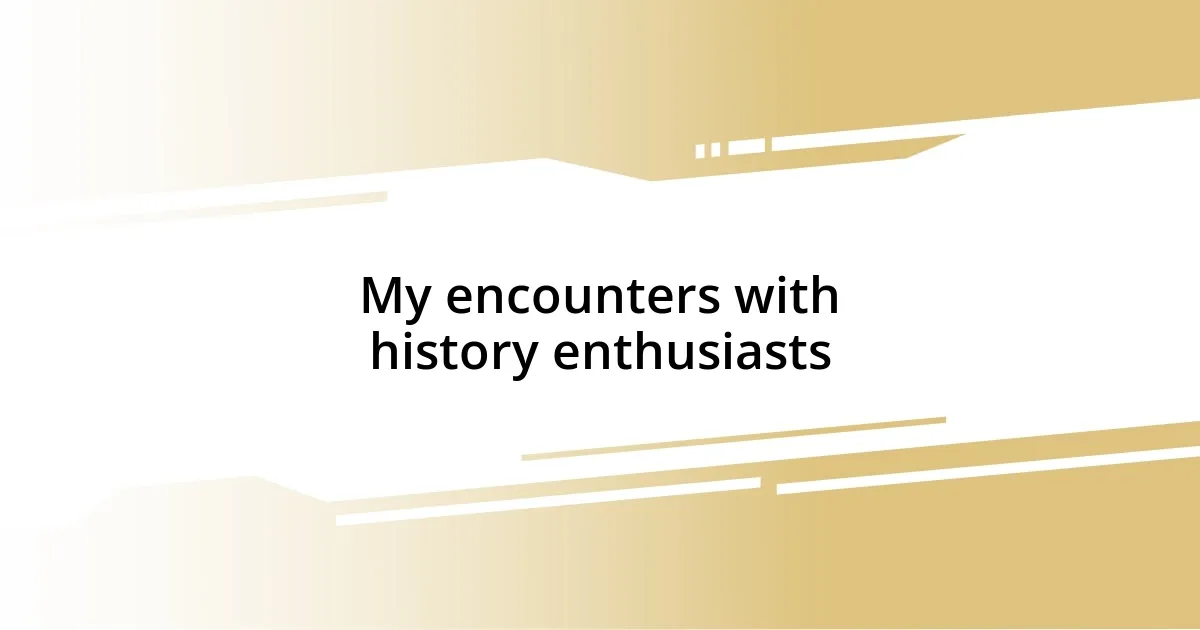
My encounters with history enthusiasts
One time, I was at a small local museum, and I struck up a conversation with a volunteer who was a retired history teacher. As we talked about various exhibits, I was struck by the passion in his voice; it was as if he was reliving each moment he described. Have you ever met someone so enthusiastic that their excitement just pulls you in? I certainly felt that spark.
At another event hosted by a historical society, I met a woman who had traveled across the country, just to attend a lecture on a niche topic—Victorian fashion. Listening to her recount stories of her research was captivating. It made me wonder: how often do we ignore the rich stories that everyday objects carry? This encounter reminded me of the layers of history hidden in our daily lives, waiting to be discovered.
Then there was the time I attended a reenactment. The participants didn’t just dress the part; they embodied their characters with such conviction. As I watched them, I found myself immersed in their world. Isn’t it amazing when history comes to life like that? Those moments made me appreciate how deeply invested enthusiasts can be, transforming facts into immersive experiences that resonate on a personal level.
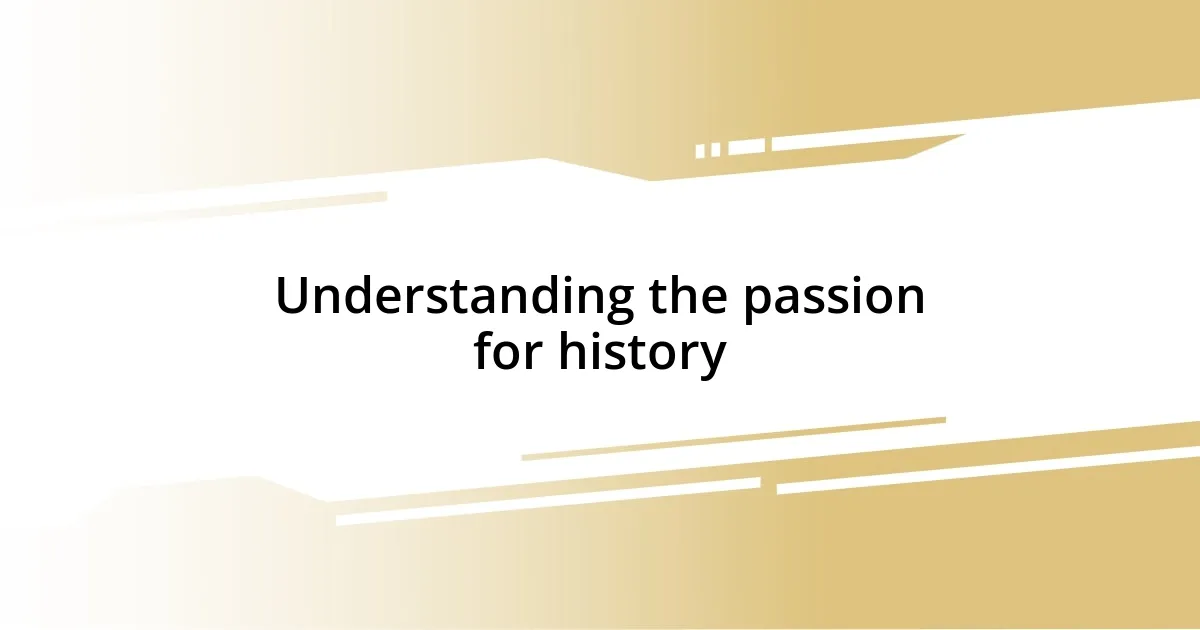
Understanding the passion for history
The enthusiasm for history often feels like a shared secret among enthusiasts—something truly intimate and personal. I once joined a book club focused solely on historical novels, where the conversations flowed like a river of insights. Each member brought their own perspective, fueled by experiences and the excitement of uncovering hidden narratives. I could see the joy on their faces as they connected plot lines to real events, and it was a reminder that history isn’t just a subject; it’s a living, breathing tapestry of human experience.
Here are a few key reasons why people are so drawn to history:
- Connection to the Past: Many enthusiasts feel a deep sense of belonging when they engage with history, as it connects them to their roots and cultural heritage.
- Lessons Learned: History offers a lens through which we can analyze past mistakes and triumphs, providing valuable lessons for the present and future.
- Storytelling: Let’s face it—humans love a good story! Whether it’s about triumph, tragedy, or intrigue, history is replete with narratives that captivate the imagination.
- Community and Belonging: Being part of historical societies or clubs fosters a sense of community, as like-minded individuals share a passion for exploration and discussion.
- Curiosity about Human Nature: Understanding the historical motives and actions of people can be enlightening, revealing the complexities of human nature through time.
I’ve often noticed that when history enthusiasts share, it’s as if they’re unveiling pieces of their own identity. They aren’t merely recounting dates and events, but rather sharing fragments of their soul that intersect with those stories. What a powerful way to create connections through lessons learned across generations!
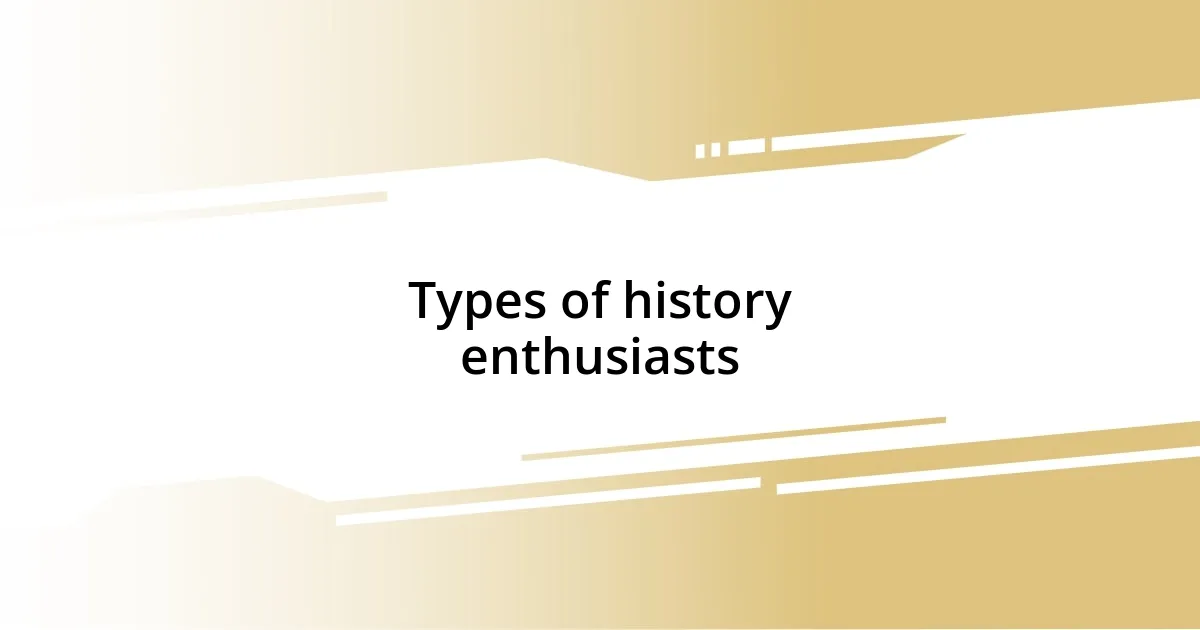
Types of history enthusiasts
History enthusiasts come in various forms, each with their unique approach and interests. For instance, there are the Casual History Buffs who love to read historical novels and watch documentaries, often while sipping coffee in cozy corners. I once chatted with one of them who was passionately recounting a plot twist from a historical drama. I could sense her excitement was pure joy as she connected fiction to real-life events. Doesn’t it feel great when someone’s passion is so infectious that it compels us to learn more?
On the other hand, we have the Academic Historians—the researchers and professors entrenched in rigorous study. A friend of mine, who is a university lecturer, often spends weekends buried in archives, delving into dusty manuscripts. Sharing a dinner with him revealed how every historical fact he discusses is tied to a broader context, like a puzzle coming together. Can you imagine the thrill of uncovering a piece of history that has eluded scholars for decades? These enthusiasts drive the field forward, reminding us that history is not just about the past but continues to evolve.
Lastly, let’s not forget the Living Historians, such as reenactors or historical interpreters. I remember attending a historical fair where a reenactor, fully in character, updated his portrayal based on recent findings. Watching him interact with the crowd was unforgettable. It made me realize that these enthusiasts literally embody the past, creating a bridge for us to connect emotionally with history. Isn’t it fascinating how different types of enthusiasts connect with history in unique ways, each adding richness to our understanding?
| Types of History Enthusiasts | Description |
|---|---|
| Casual History Buffs | Enjoy books and documentaries; often discuss history in a relaxed manner. |
| Academic Historians | Engaged in research and teaching; focus on in-depth analysis and scholarly dialogue. |
| Living Historians | Participate in reenactments or interpretation; bring history to life through performance. |
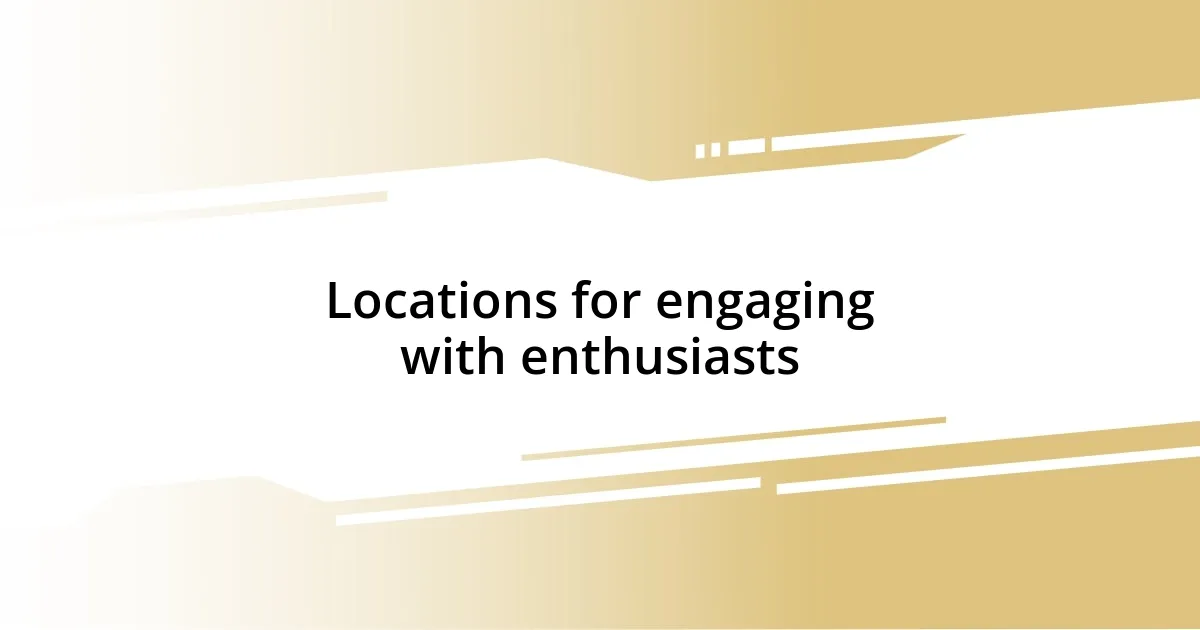
Locations for engaging with enthusiasts
One of my favorite places to engage with fellow history enthusiasts is at local museums. I recall wandering through an exhibit on the Civil War and striking up a conversation with a visitor. We both shared our thoughts on how specific battles shaped the country’s future. It was exhilarating to exchange insights with someone who saw the past through a different lens. Have you ever felt that spark of connection in such a space? It’s these casual encounters that remind us how history resonates differently with each individual.
Historical societies also serve as vibrant hubs for passionate discussions. I joined one where we explored the local history of our town, and I was amazed at the enthusiasm everyone had. One member shared a treasure trove of photos from the 1800s, igniting stories about family roots and forgotten events. Could there be a more authentic way to bond over our shared history? The palpable excitement in the room made every meeting feel like a mini celebration of our collective past.
Lastly, I think about attending historical reenactments as a unique way to connect with enthusiasts. I vividly remember standing at a reenactment of a Revolutionary War battle, with musket shots echoing in the air. As I watched actors bring history to life, I found myself lost in the moment, the costumes and cannon fire creating a visceral experience that books alone could not replicate. Isn’t it incredible how immersing ourselves in history can evoke such strong emotions? Those moments fuel our passion and create lasting memories that surface every time we discuss our shared love for the past.
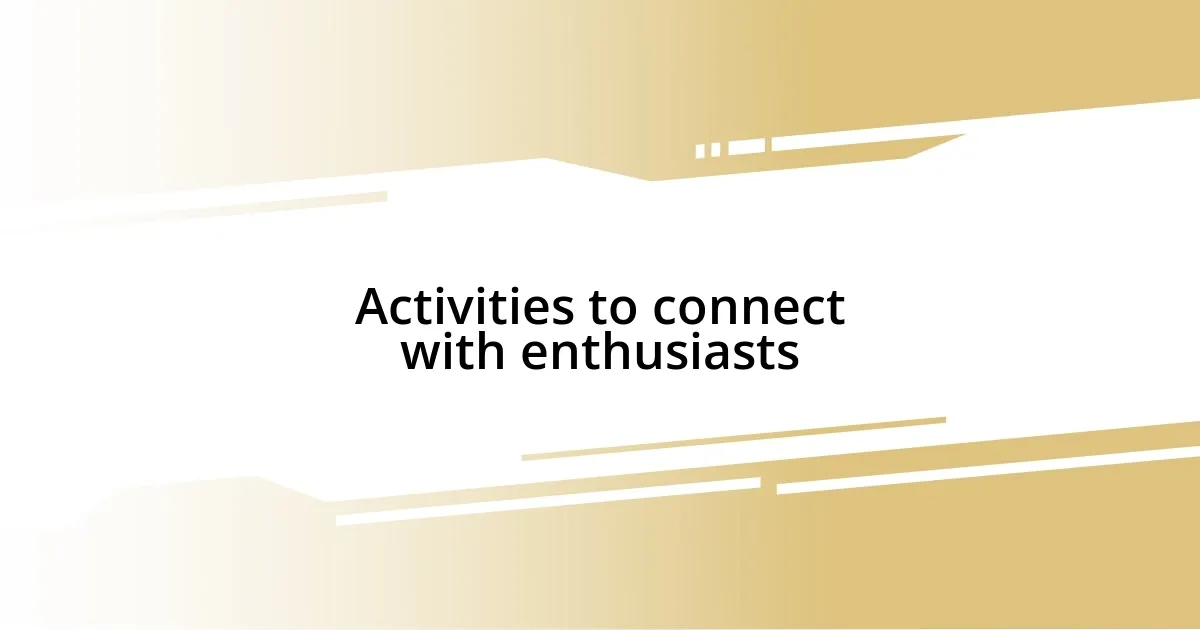
Activities to connect with enthusiasts
Engaging with history enthusiasts can take many forms, and I’ve found that organizing book clubs centered around historical themes is particularly rewarding. I’ve participated in groups where we chose a different historical novel each month. I remember one session devoted to a book about the women of the French Revolution. The discussions ignited diverse opinions and perspectives that really deepened my understanding of that era. Have you ever felt how a single story can crack open a world of discussion and insight?
Moreover, attending lectures or workshops with guest historians can truly enrich our connection with the past. At a recent workshop, I was captivated by a historian who spoke passionately about ancient Rome’s influence on modern governance. Listening to him felt like being transported in time, as he shared anecdotes about political intrigue and societal norms. The questions he posed to the audience made us think critically about our own society. It’s fascinating how these interactions can shift our viewpoints, isn’t it?
I’ve also enjoyed participating in online forums where history buffs gather to share their findings and theories. One evening, I jumped into a discussion about the impact of World War II on everyday life. I was pleasantly surprised by the level of knowledge and personal stories shared by others, which often included family connections to the war. These exchanges can feel like a digital campfire, where collective memories and insights illuminate our understanding of history. How often do we get to connect with individuals from different backgrounds, all united by a shared passion? The beauty of it lies in those conversations that linger long after the screens go dark.
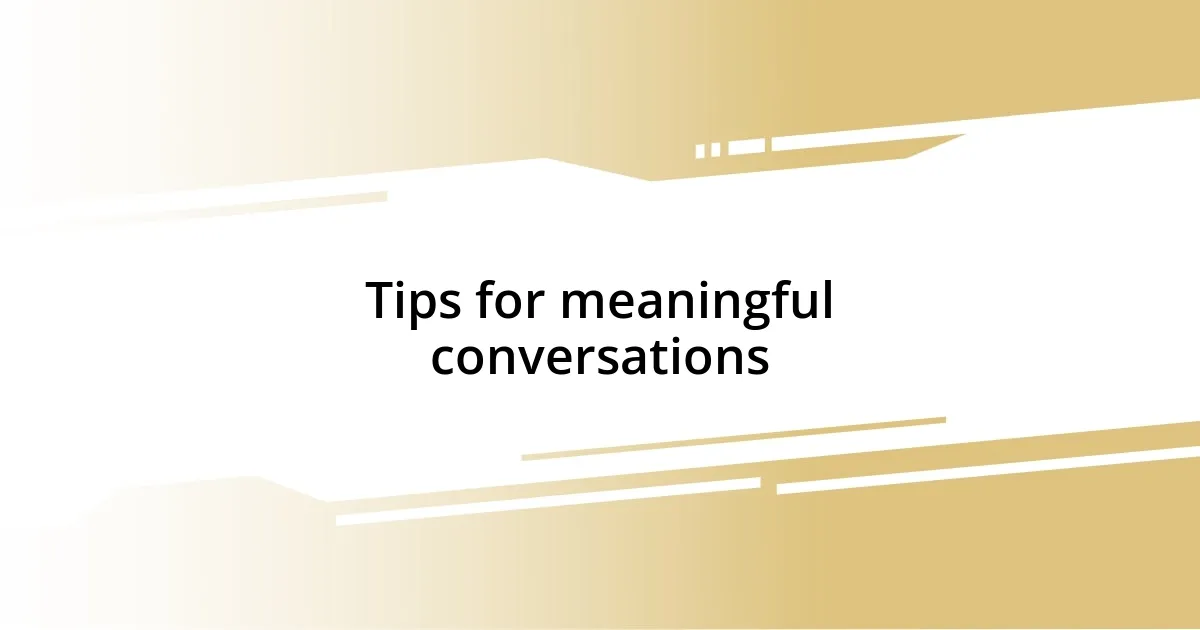
Tips for meaningful conversations
Engaging in meaningful conversations with history enthusiasts requires a genuine curiosity about their perspectives. I remember one evening at a history-focused dinner party, a fellow guest sparked a discussion about ancient civilizations. I asked her what aspect of that era fascinates her most, leading to an eye-opening debate about the societal structures of Mesopotamia. This simple question opened the floodgates of her passion, and I found myself captivated by her stories and insights. It made me realize how essential it is to ask open-ended questions that allow others to express their knowledge and enthusiasm.
Another approach I’ve found valuable is actively listening—really tuning in to what others are saying instead of just waiting for my turn to talk. At a local lecture, I once encountered a retired professor who shared his journey through various historical research projects. His passion was infectious, and by giving him my full attention and asking follow-up questions, I learned more than I could have imagined about the nuances of historical methodology. Have you ever noticed how acknowledging someone’s expertise can strengthen that connection? Listening isn’t just about hearing; it’s about valuing someone else’s experience and letting them know you genuinely appreciate their input.
Additionally, fostering an inviting atmosphere can significantly enhance conversations. I recall hosting a small gathering where we each brought a historical artifact or document to discuss. The excitement in the room was palpable as we took turns sharing our items and delving into their stories. Each object held a unique piece of history, revealing layers of connection amongst us. Isn’t it incredible how tangible items can evoke such powerful dialogues and emotions? Creating that space for sharing not only enriched our discussions but also deepened our bonds as history lovers.
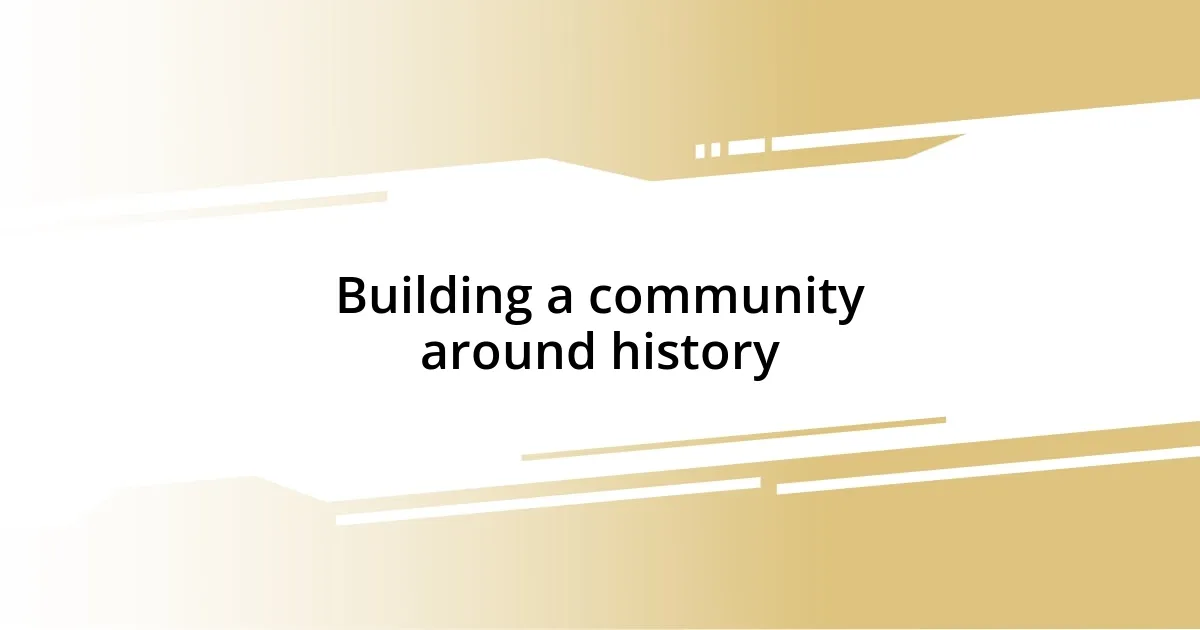
Building a community around history
Building a community around history can be immensely rewarding. I recall a time when I volunteered at a local museum, helping to organize an exhibition on the Civil Rights Movement. Gathering with other volunteers felt like being part of something much larger than ourselves. As we delved into the stories of brave individuals, my heart swelled with pride, and every conversation reinforced our shared commitment to preserving important narratives. Have you ever experienced the magic of working together towards a common goal?
Another memorable moment was when I joined a heritage walk in my city, highlighting historical sites connected to immigrant communities. The group was small but diverse, with each member sharing their family’s journey and struggles. Listening to their stories fostered a profound connection among us. It got me thinking—how can personal anecdotes transform our understanding of broader historical events? When we share our stories, we weave a rich tapestry that honors our past and builds empathy for one another.
I’ve also found that history-themed potluck dinners can spark unexpected connections. At one dinner, a friend brought her grandmother’s recipes from the Great Depression, and we spent hours discussing how economic struggles shaped our families. It was amazing how food could open up a passionate dialogue about resilience and adaptability throughout history. Isn’t it fascinating how something as simple as sharing a meal can bridge generations and create a warm, inviting atmosphere where history thrives?

